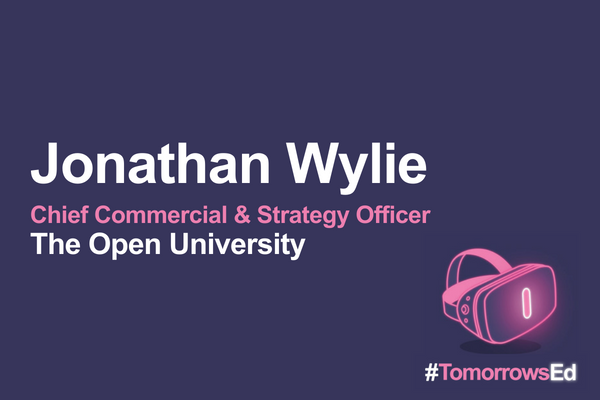Reflecting on the Future of Education prompted me to think about the history of our sector a little, writes Jonathan Wylie, Chief Commercial and Strategy Officer at The Open University.
It has been nearly two decades since, in a statement to Parliament about the government’s education proposals outlined in the Learning to succeed white paper, Lord Blunkett (then Secretary of State for Education and Employment) stated the important role that learning has in economic prosperity:
“Above all, we aim to modernise learning and skills for the economic challenges of the new century. Investment in human capital will be the foundation of success, both economically and in building a cohesive society.”
Economic challenges still exist today underpinned by shifting business environments and the now well-publicised skills shortages. Indeed the government’s current Industrial Strategy highlights the availability of skills in the UK workforce as a key factor in our future success.
When businesses lack the skills needed to really drive them forward it can severely impact their efficiency, profitability or sustainability and their growth.
We can see this impact at a local (within organisations) and at national level through how competitive the UK can be on a global stage. For example the UK employment levels are near an all-time high but despite this our productivity is behind that of other G7 members.
Recruitment challenge
The July 2018 Open University Business Barometer collaborated with 950 senior business leaders in the UK, providing a representative snapshot of organisations both large and small-to-medium. It revealed that more than three in five senior business leaders in the survey (62%) admit there is a skills shortage in their workplace and that many of them (61%) feel that this shortage has worsened in the last 12 months.
The impact is a growing recruitment challenge with many organisations hiring staff at lower levels than intended, increasing the salary offer, increasing training costs or absorbing increased temporary staff costs.
Our research has estimated that the total cost of the UK skills shortage to businesses is £6.3 billion a year. As small and medium enterprises (SMEs) make up 97 per cent of organisations in the UK (excluding microbusinesses), they are taking on the majority of the cost of the skills gap.
The skills shortages can be seen across geographic boundaries as the map below illustrates and through all major sectors. The health and social care, manufacturing, hospitality and retail sectors for example are spending the most on inflated salaries, temporary staff, training and recruitment.
Skills demand is not static. If we take just the examples of technological change (for example AI and automation) and the impact of the UK leaving the European Union, we can predict extensive changes over the next two years on how organisations adapt to reductions in lower skilled jobs or how they recruit, develop and retain talent and expertise.
‘Needs to change’
If we are to tackle the challenges of skills shortages, particularly at a time when many organisations expect the situation to deteriorate over the coming year, then the model for, and how we think about, post-school education needs to change.
We need now to genuinely make the shift from thinking that our formal learning stops when we leave school, or once we have completed other tertiary education, and our educational systems, processes and organisations need to enable and support that step change.
Lifelong learning and training are a crucial part of this current puzzle. Investing in training and development is one of the most important ways that organisations can help to reduce the skills shortage.
Although this will not deliver immediate results for businesses, it is one of the only long-term solutions that can ensure the UK labour market as a whole is future proofed and equipped with the skills that are in demand now and are agile enough to adapt to changing future demands.
It is clear to me that higher education can and should play a vital and ongoing role in working with employers to provide a more sustainable solution to meeting the changing skills demands for organisations.
Examples of this model shift are in the increasing provision of Higher and Degree Apprenticeships and developing courses with employers that meet the needs of their businesses and the UK labour market.
Transforming lives through education
That is why, as a university with such a strong mission to transform lives through education, The Open University is committed to working with organisations and employers to provide training solutions, fill skill gaps and develop staff as an essential element of delivering our social justice mission through providing high-quality university education. We currently work with 60 of the FTSE 100 and overall with 1,300 employers to deliver courses tailored to the needs of the labour market. We also deliver apprenticeships to over 130 businesses.
For me the future of education has a social mission; to provide opportunities and education in a changing world for those that want it and need it, and a UK plc mission; to support the needs of business and industry to ensure we have a workforce that is agile and equipped for the future challenges that we may not even be able to articulate yet.
Jonathan Wylie, Chief Commercial and Strategy Officer
The Open University




